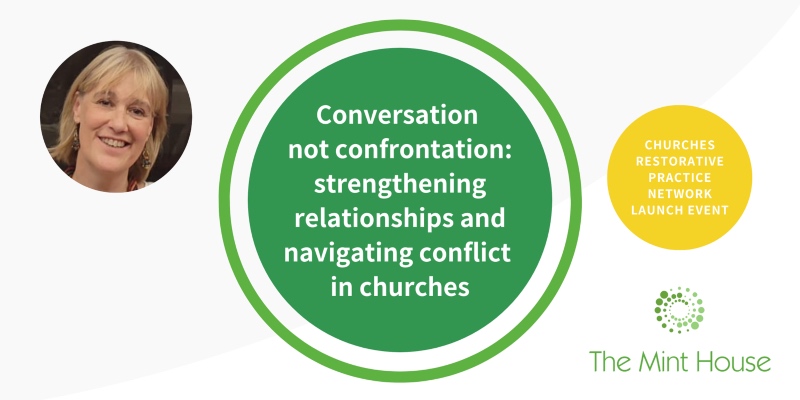Transforming your church community through restorative practices
The newly established Churches Restorative Practice Network wants to help ministers and leaders develop the skills needed to bring about healing and reconciliation within their congregations - and introduces its launch event on 12 November

How often have you experienced the pain of watching relationships fracture over misunderstandings, seen members drift away after conflicts, or struggled to address harm in ways that truly restore relations rather than festers resentment.
This sadly, is too often the case in our churches, large or small.
The challenge for leaders is to know how to address these issues in preventive and proactive ways. Restorative Practices, aligned with Christ's own ministry of reconciliation, offer a unique transformative approach to overcoming conflict ensuring wounds are not left unhealed and communities divided.
Restorative practice avoids blame games by focussing on repairing harm. The question is not “who is to blame?” but rather “Who has been harmed, and how can we make things right?"
This shift in focus from criticism and judgement to healing and reconciliation creates space for:
-
Deeper Relationships: Members learn to engage authentically, share vulnerabilities, and support one another through difficult conversations
-
Stronger Faith: As people are empowered to listen and empathise, they encounter God's grace in powerful, tangible ways
-
Vibrant Community: Conflicts become opportunities for growth rather than sources of division, creating a culture where people feel truly seen, heard, and valued
By developing a restorative culture, churches can look forward to experiencing:
-
Reduced member turnover and stronger retention
-
More effective leadership teams with healthier communication
-
Congregation members who feel empowered to address issues directly and lovingly
-
A reputation in the community as a place of genuine healing and grace
To explore these possibilities, we invite you to the launch event of the newly established Churches Restorative Practice Network. The network has been established by a group of church leaders experienced in conflict transformation who are committed to helping ministers and leaders develop the skills and competences needed to bring about healing and reconciliation within their congregations.
The Churches Restorative Practice Network is being coordinated by The Mint House (Oxford Centre for Restorative Practice) with steering group members from other organisations such as The Blackley Centre, Eastern Baptist Association, Southern Counties Baptist Association, and Regent’s Park College Oxford.
The aims of the network are to provide opportunities for training, ongoing support, and a community of like-minded leaders committed to building the beloved community Christ calls us to be.
Ready to discover how Restorative Practices can transform your church culture? Join us on November 12 from 12-1pm (online) for our launch event ‘Conversation not confrontation: strengthening relationships and navigating conflict in churches’.
This will be a practical event led by Baptist minister the Revd Jo Williams (Director of Reconciliation, The Blackley Centre) sharing examples of how to have good conversations both inside church congregations and in outward looking/missional ways engaging with/in local communities.
She will equip us with ideas of how to have conversations in restorative ways which will strengthen relationships while addressing issues that occur. She will also point us towards the theory and theology of restorative practice and how this is relevant to those in church ministry.
The Mint House is coordinating this event and you can register on its website here.
We would love to see you there.
Myra Blyth, former Deputy General Secretary of the Baptist Union, is a founding trustee of The Mint House, and is part of the group steering this new network.
She told The Baptist Times, 'It’s an exciting moment in which to launch this network because we live in a very fragile world where conversation too quickly becomes toxic. Our challenge (in and outside the church) is to model a way that renews the art of creative conversation and restores relationships where harm threatens to reap destruction.'
Steering group members, Churches Restorative Practice Network
Baptist Times, 06/11/2025